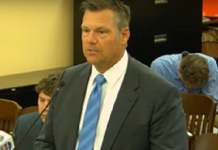A bill establishing a parents bill of rights and requiring school districts to screen library books for offensive material came under sharp criticism Wednesday as lawmakers seek to give parents more of a voice over educational material.
Opponents lined up Wednesday to register their objections to a broad House bill that gives parents enumerated rights that are intended to ensure they can “direct the upbringing, education, care and mental health” of their children.
The bill, heard Wednesday in the House K-12 Budget Committee, would require local school boards to develop policies with input from parents, teachers and school administrators that would guarantee a parent’s right to be involved with their child’s education.
The bill attracted many opponents who said the bill isn’t necessary, weakens vaccine requirements, may lead to censorship of books and could lead to the prosecution of teachers who unwittingly expose students to educational material deemed as offensive.
Among other things, the bill of rights says parents have the right to be informed and inspect the curriculum and instructional materials used in a student’s instruction.
It also says parents can expect teachers to work to eliminate “coercion” that forces them to support actions and ideologies that violate their individual “professional integrity.”
And it also says that parents can expect teachers to “present facts without distortion, bias, or personal prejudice.
It also says that schools will not contract for teacher professional development with providers that promote “racially essentialist doctrines or practices.”
“Parents are the primary deciders of what’s best for their children, and they look upon the public schools and trust the public schools are going to do the right thing,” said former House Speaker Mike O’Neal, testifying for the bill on behalf of the Kansas Policy Institute.

“There seems to be outrage at the thought that there might be a right on the part of parents to know what’s going on in their schools,” O’Neal said.
Critics, meanwhile, said the bill of rights provides nothing more than what parents already can access currently and is drawn up to make educators look bad.
“Parents already have more access to their children’s education than ever,” said Judith Deedy, executive director of Game on Kansas, which advocates for public education.
“We object to creating an appearance that our school districts are already not doing these things,” Deedy said.
She feared the bill would be used against its opponents to characterize them as fighting against parents’ rights and school transparency.
She said the bill was part of a national effort to “score political points and bring our schools into a culture war.”
Lauren Tice Miller, a lobbyist for the Kansas National Education Association, stressed a similar point in testifying to the committee.
“While a portion of this bill is referred to as the parents bill of rights, it is not affording parents anything more than a duplication of what is already available right now,” she said.

But Brittany Jones, director of policy and engagement for Kansas Family Voice, said the bill empowers parents.
“This is what arms parents with the knowledge of what their children are being taught and gives them tools to actually engage with their children’s education,” Jones said.
The bill, however, also includes other provisions to promote curriculum “transparency,” but critics say will lead to censorship in the schools.
The transparency portions call for school districts to provide a variety of information on their website about the educational material available to students, including any books “designated for parental review.”
The bill lays out that any book, magazine or material in the school library would be required to be designated for parental review if they meet criteria that include excessive violence or profanity and sexual acts, among other things.

A school district would be required to review each book, magazine or any material in each school library that was purchased on or after July 1, 2017, to determine whether they should be designated for parental review.
School districts would not be required to review materials purchased before that date, but they would be required to designate any material known to meet the criteria as designated for parental review.
A school district would be required to review all library reading materials purchased
on and after July 1, 2022, and designate them as necessary under the bill.
The Department of Education estimates it could cost school districts millions to create the transparency portal for posting classroom material as well as reviewing every book and magazine to determine whether it should be designated for parental review.
The bill also removes the affirmative defense to the crime of promoting material harmful to minors for public and private schools.
The law now only applies to commercial establishments but would be expanded to include public establishments.
Violation of the part of the law would be classified as a class B nonperson misdemeanor and would carry a sentence of up to 6 months in jail and a fine of up to $1,000.
Tom Witt, executive director of Equality Kansas, said eliminating the affirmative defense would lead to educators being unwittingly prosecuted.
“It’s about locking up teachers for providing approved curriculum materials to their students,” Witt said.
“This bill would remove that current affirmative defense and leave teachers liable to being arrested for teaching materials that are approved curriculum material,” he said.
Opponents of the bill said it opened the door to censorship in the schools.
They pointed to how the bill of rights calls of school boards to write policies for parents to challenge the educational benefit of any book, magazine or any material available in the school library “such that a successful challenge results in the removal of the book, magazine or material from the school.”
The bill “outlines a process to ban books, thereby stifling facts deemed controversial and
creating an environment to freely censor the exchange of ideas,” said Aileen Berquist, lobbyist for the American Civil Liberties Union of Kansas.
“The 1st Amendment protects the right to share ideas and the right of listeners to receive information and share knowledge — including students’ unfettered access to books,” Berquist said in written testimony.
“Legislation that attempts to censor books based on discussions of race and racism and/or gender and sexuality run afoul of students’ 1st Amendment rights to receive information and share ideas,” Berquist said.
Williams said in an interview that the bill relies on language from existing statute, and she’s confident it doesn’t run afoul of the constitution.
“There is no censorship in the bill,” Williams said.
The Augusta lawmaker said she’s received an increasing number of complaints from parents upset about books on school library shelves.
“There are books that are concerning, that are harmful to kids, and those local school districts need to evaluate that,” she said.
“The Legislature is not evaluating it. We are setting up a framework for our local boards to do so,” she said.
“I honestly feel like we are responding to parents and their concerns,” she said, “while also maintaining balance for the school district by requiring transparency.”















